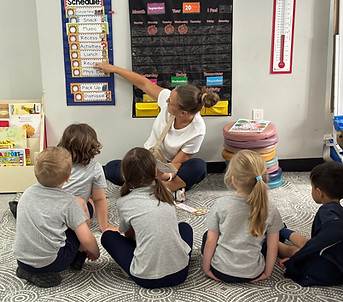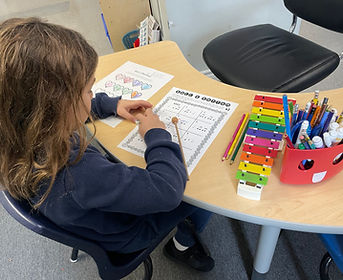Kindergarten, Grade 1 & Grade 2
In our Kindergarten, Grade 1 and Grade 2 programs, students are supported by a team of core teachers, an ECE, and specialized teachers for Art, Music, French, Physical Education and Outdoor Education.
Kindergarten
The Ontario Kindergarten curriculum focuses on four key areas called the
Four Frames of Learning:
-
Belonging and Contributing
-
Self-Regulation and Well-Being
-
Demonstrating Literacy and Mathematics Behaviours
-
Problem Solving and Innovating
The four frames of Kindergarten (outer circle) grow out of the four foundations for learning and development set out in the early learning curriculum framework (inner circle). The foundations are essential to children's learning in Kindergarten and beyond. The frames encompass areas of learning for which four- and five-year-olds are developmentally ready. Enriched Kindergarten at King's Town School is the best option for parents who want their child to have a head start in academics.
Grade One
The Grade One curriculum builds upon the Four Frames of Learning to emphasize academics and Social Emotional Learning (SEL). Explicit instruction in language and numeracy provides a structured foundation for concepts like phonics and early numeracy and has consistently shown its effectiveness in helping students succeed.
There are daily opportunities for leadership, creativity, and outdoor exploration that nurture independence and confidence. Enrichment in French, music, and physical education, combined with a supportive and caring environment, ensures each child is known, valued, and inspired to reach their full potential.
Grade Two
Moving into Grade Two, students focus on reading, writing, and mathematics while developing curiosity through science, social studies, and the arts. Students are challenged through an engaging curriculum that deepens literacy, numeracy, and critical thinking skills while fostering creativity and curiosity.
Beyond academics, Grade Two learners begin to take on greater responsibility, developing independence and leadership through classroom roles, collaborative projects, and community initiatives. With personalized support and a focus on character growth, we prepare students not only for academic success but also to become confident, compassionate leaders in and out of the classroom.
Community Model
In the early years of schooling, children bring with them a wide range of strengths, needs, and developmental timelines—particularly in literacy, numeracy, self-regulation, and language development. Research shows that grouping students strictly by age or grade often fails to address this diversity, potentially leading to missed opportunities for both academic growth and social-emotional development.
This progressive, blended approach reflects the best of early childhood education and supports our commitment to nurturing responsive, inclusive, and developmentally appropriate learning spaces. Grounded in the values of respect, responsibility, and community, the program balances exploration and discovery with explicit, systematic instruction and activity-based learning.




%20large_JPG.jpg)